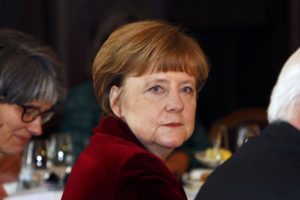Special to WorldTribune.com
By Dr.Fariborz Saremi, August 28,2017
Since the Second World War German leaders have, understandably, shrunk from the idea that their country can exercise leadership on the global stage. The view in Bonn and then Berlin was that German power should be exercised through Europe.
But the EU is no longer enough. Foreign policy challenges refuse to be ignored: A U.S. President who questions the NATO alliance, war in Ukraine, refugees from a collapsing Middle East and North Africa, Brexit, Turkey’s nationalist turn and the triple alliance of Russia, Turkey and Iran.

The EU is weak and Germany too strong and too large for “Europe” to be a complete response to all these challenges. Germany needs a more imaginative and assertive approach to the world, alongside an appreciation of the limits of what it can do alone.
Start with the military spending. In the age of President Trump and President Putin, the issue can no longer be avoided.
Germany spends less than 1.2 percent of gross domestic product on defense, compared with a NATO target of 2 percent.
Germany is rising on the global stage and most probably will become one of the five global powers in the next 10-15 years (with U.S., China, Russia and Japan). Therefore, it needs a strong military force. German largesse could also go into the funding of proper border police for the EU and refugee processing centers and stabilization funds for North African countries such as Libya and Algeria.
The idea of a “European army” remains popular in Germany. But deep military integration is unrealistic when EU countries are divided on fundamental foreign policy issues.
Germany also faces crucial diplomatic challenges.
On Brexit, the Merkel government has to balance maintaining EU unity with the broader interest in a solid economic and strategic relationship with Britain.
When it comes to Russia, Germany has done a courageous job of leading the EU sanctions effort over Ukraine. The danger now is that a U.S. policy shift will cut the ground from underneath Ms. Merkel.
A new policy is needed between Chancellor Merkel and President Putin. Germany and the EU are dependent on Russia’s energy. A new Pipeline (Nord Stream 2) is being built in rough parallel to the existing Nord Stream 1 and will carry another 55 billion cubic of natural gas per year. The project aims to carry Russian natural gas under the Baltic Sea, bypassing countries like Ukraine, Poland and the Baltic seas.
Berlin’s next coalition in the Bundestag will have to break with two powerful dogmas of post-World War II Germany: a balanced budget and a pacifist mindset.
That said, Germany’s postwar doctrines are not as intractable as they seem. Konrad Adenauer had already decided to rearm West Germany against the advice of many in his own party in the early 1950s.
Meanwhile, the EU is in a fragile condition. An end to its economic slowdown is still out of reach as the United Kingdom is in the process of leaving, and populism continues to rise across many member states.
Brexit, the Ukraine crisis, migration crisis and terrorism have initiated debates about the effectiveness of Europe’s security policies which confront common threats such as terrorism, cyber security and humanitarian issues.
In this uncertain environment, there is an opportunity for Germany to take a leading role in European security policy, based on competencies and threats specific to Europe.
Germany should promote the building of capabilities to meet today’s most pressing dangers. An increase of Germany’s military budget has the potential to change crucial dynamics within the EU. The European project is already suffering under political and economic imbalances.
Therefore, Germany must be strategic about its investments. It has the unique opportunity to increase its military spending while at the same time strengthening EU security and becoming again a leading and rising power.
Europe is billions of dollars short of affording strategic autonomy. A recent closed-doors exercise with former top officials from the Pentagon as well as senior European officials revealed that neither side could properly defend Europe from Russian hybrid attacks.
By achieving its target of 2 percent of its GDP, Germany’s additional $30 billion in military spending could make all the difference between a stronger Europe and a weaker one.
Dr.Fariborz Saremi is a German-Iranian strategic analyst based in Hamburg Germany. He currently advises German parties on geopolitical issues, the Middle East and Iran and writes for several English language publications including WorldTribune.com and FreePressers.com.
